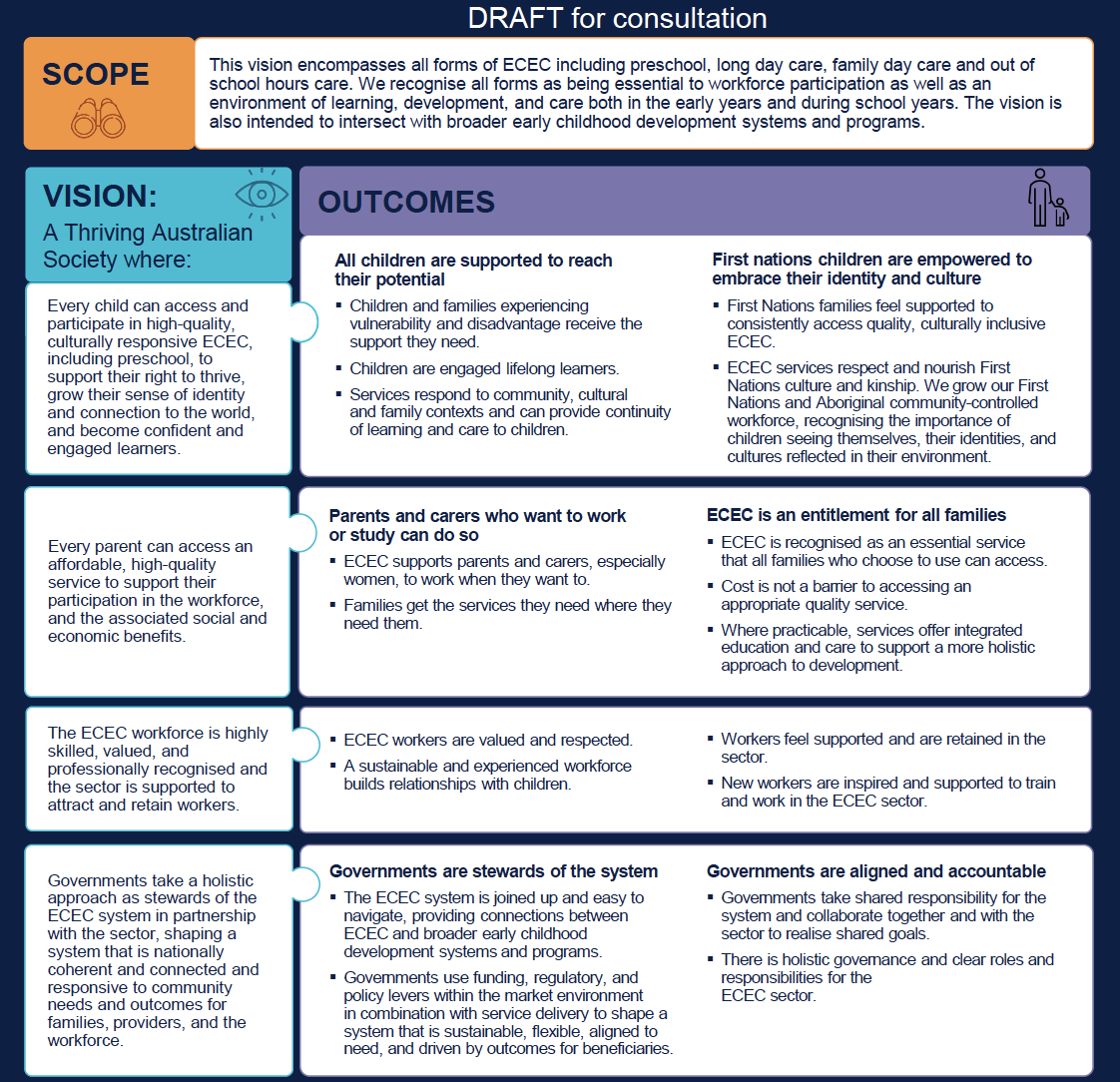Examples
Policy
National Cabinet’s draft vision for ECEC sees Governments as “stewards” of a transformed system

Jason Roberts
Mar 21, 2023
Save
A long term vision for early childhood education and care (ECEC) in Australia, commissioned by the National Cabinet ahead of last year's Jobs and Skills Summit, is starting to take shape with a draft version of the vision released for consultation by the Federal Department of Education. 
The vision has been informed by principles provided by the National Cabinet and formulated by federal, state and territory education and early years ministers. It aims to encompass all forms of ECEC including preschool, long day care, family day care and out of school hours care and will be used to drive future reform.
A key addition to the language around ECEC included in the vision is Governments framing themselves as “stewards” of the system using levers such as funding, regulation and policy within the market environment to create outcomes aligned with longer term objectives.
The release of the document comes at a point in time when Federal focus on transforming the ECEC sector appears to be at very high levels with a recent Senate Committee inquiry recommending a substantial transformation and the Government Commissioned Productivity Commission Inquiry into the sector kicking off.
Equity, affordability, quality and accessibility at heart of new vision for ECEC
In confirming the scope of the new vision document, the Government noted that it recognises ECEC as being essential to workforce participation, high quality learning, development, and care outcomes, both in the early years and during school years, and that it the vision intended to intersect with broader early childhood development systems and programs.
The key outcomes the vision will deliver on are as follows:
- All children are supported to reach their potential
- First nations children are empowered to embrace their identity and culture
- Parents and carers who want to work or study can do so
- ECEC is an entitlement for all families
- ECEC workers are values, respected, supported and retained in the sector
- The ECEC workforce is sustainable with new workers inspired to join
- Governments are stewards of the system
- Governments are aligned and accountable
Governments in their role as “steward” will use funding, regulatory, and policy levers within the market environment in combination with service delivery to shape a system that is sustainable, flexible, aligned to need, and driven by outcomes for beneficiaries.
Vision recognises the need for foundations to be built if success is to be achieved
As part of the vision, the Government acknowledges that a number of key enablers will be needed in order to meet the vision's objectives. These are issues and challenges already being managed through by the sector at large. The Government calling them out as key components of the National Vision highlight their importance and signal the likelihood of further policy action to come to address them.
The key enablers, and objectives attached to them are as follows:
Workforce: Attracting, training and retaining a high quality workforce is a critical factor in achieving the vision.
Leadership: Quality leadership is essential at all levels: leadership from governments and within governments, leadership from prominent advocates and community members, leadership by providers and within the workforce. Leadership must be effective, clear, and aligned to the vision.
Data and evidence: Policies, models, and interventions must be underpinned by comprehensive high quality data and evidence.
Accountability framework: Clear roles and responsibilities are critical, especially with shared system stewardship.
Communities and families: Services must be shaped around the needs of communities and families of all backgrounds including First Nations people.
Philanthropy: The not-for profit sector plays a fundamental role in the sector including direct provision and the important role of philanthropic advocacy and investment.
The Federal Department of Education is now collecting feedback on the draft national vision between 17 March and 7 April 2023. Submissions can be made through the Department’s website with targeted consultations, including with representatives of First Nations communities, also taking place.
Feedback from the consultation will inform the final vision which will be presented to National Cabinet in mid-2023. Once agreed by National Cabinet, the vision will provide long-term direction to achieve a quality, accessible, affordable, and equitable ECEC sector.
To view the full draft vision click here.
See below for an abbreviated version:

Don’t miss a thing
Related Articles


















